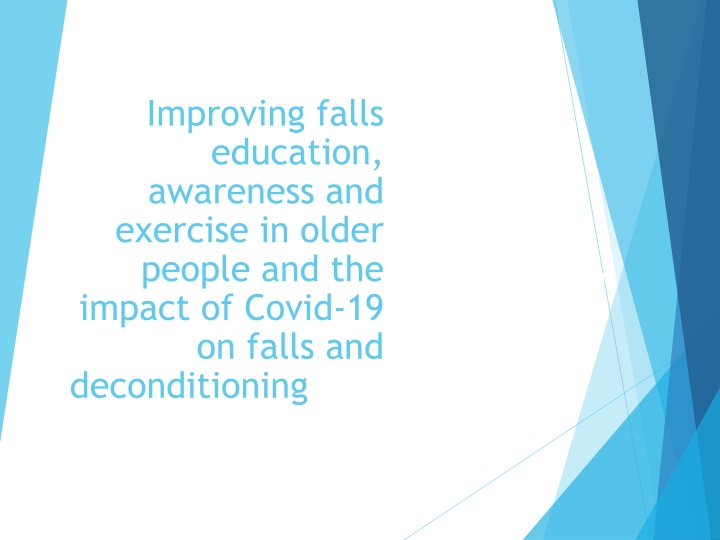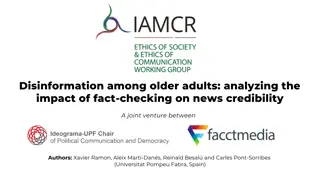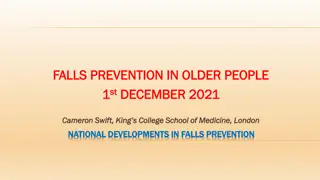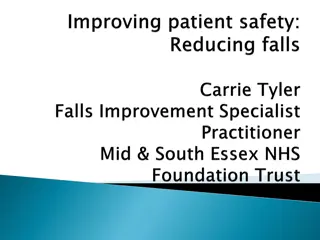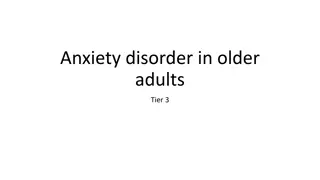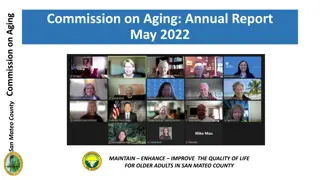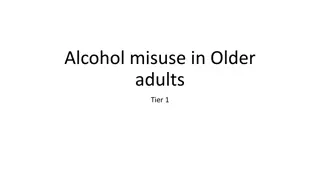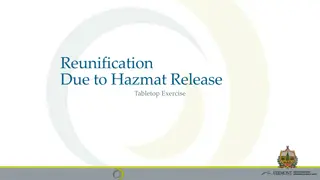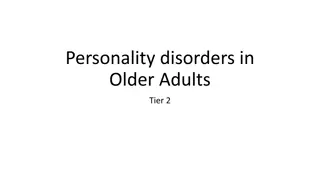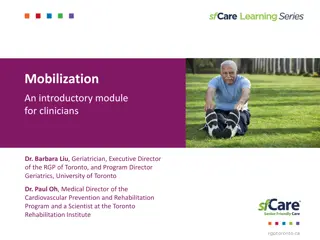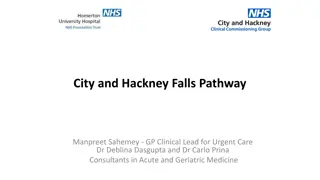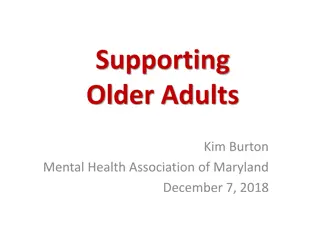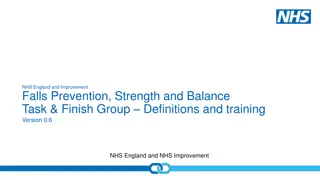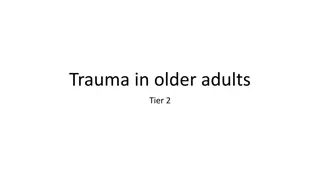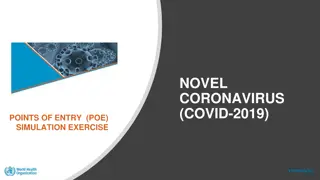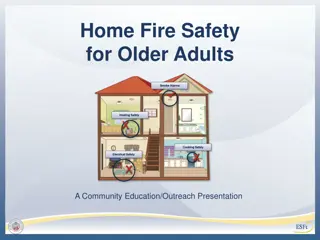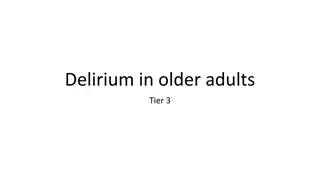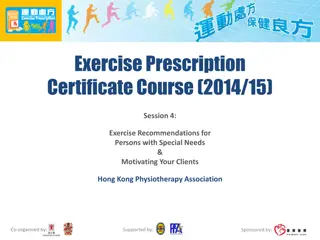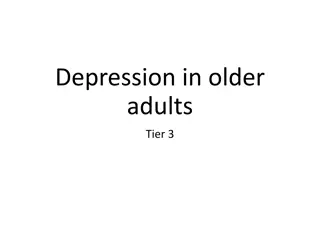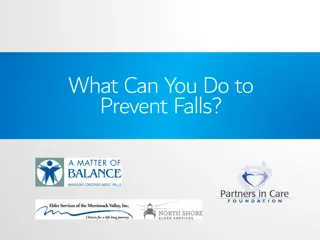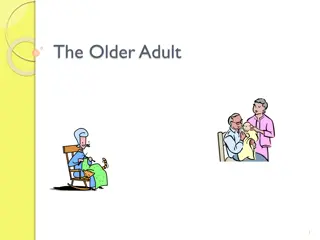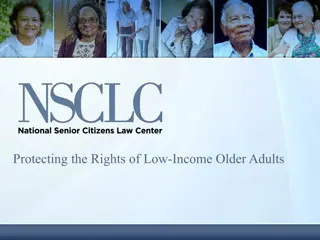Enhancing Falls Education and Exercise for Older Adults: Impact of Covid-19
Improving falls education, awareness, and exercise in older individuals, particularly considering the effects of Covid-19 on falls and deconditioning. Initiatives include community rehab and falls teams, city care falls services, and comprehensive assessments for older adults. The program focuses on strengthening balance, educating individuals on fall prevention, and promoting active lifestyles through tailored interventions and support.
Download Presentation

Please find below an Image/Link to download the presentation.
The content on the website is provided AS IS for your information and personal use only. It may not be sold, licensed, or shared on other websites without obtaining consent from the author.If you encounter any issues during the download, it is possible that the publisher has removed the file from their server.
You are allowed to download the files provided on this website for personal or commercial use, subject to the condition that they are used lawfully. All files are the property of their respective owners.
The content on the website is provided AS IS for your information and personal use only. It may not be sold, licensed, or shared on other websites without obtaining consent from the author.
E N D
Presentation Transcript
Improving falls education, awareness and exercise in older people and the impact of Covid-19 on falls and deconditioning Tamsin Peach Nottingham CityCare Falls Lead
Overview of Community Rehab and Falls team/CityCare falls services Working with patients to improve strength and balance Understanding the impact of the pandemic and lockdown on physical activity in older people Educating patients and the public to understand why falls happen, how to get up from a fall and how to reduce the risk of falling Ensuring effective referral to your falls prevention programmes
Overview of CityCare Falls Services Community rehab and falls team Care homes team Urgent care/reablement including community beds service Any one who sees patients over 65!
Community Rehab and Falls Team Generic team, see anyone over the age of 18 with identified health need all have a comprehensive assessment including medical history/medication, FRAX, BRADEN, vision/hearing, pain, limb function, continence, nutrition, falls history and coping strategies, environment, support systems, cognitive screen, sleep, mobility, transfers, ADL, PADL, ROCKWOOD frailty score Signpost to other agencies as appropriate meds management, fire service, podiatry, age UK, social prescribing, GP/community geriatrician, MDT, bone health team, telecare services .
OT (environmental assessment, adaptations, compensatory strategies, cognitive assessments, fear of falling, confidence building Physio (strength and balance assessment, MSK issues impacting balance, gait analysis, deconditioning, signposting for vestibular assessment) Assistant practitioners ongoing support of interventions and assessments Postural stability classes (1 x week strength and balance training for 20 weeks)
Working with patients to improve strength and balance Home exercise programme 4-6 weeks 1 x visit a week Group exercises 1 x week for 20 weeks Patient taking ownership of their own rehab Meaningful goals dancing, tai chi, gardening, playing with grandkids
Understanding the Impact of the Pandemic and Lockdown on Physical Activity in Older People Wider impacts of COVID-19 on physical activity, deconditioning and falls in older adults (PHE 2021) Allied heath professionals role in rehabilitation during and after COVID 19 (NHS 2020) Rehabilitation and the Big Rehab Conversation (RCOT, 2020) The COVID-19 rehabilitation pandemic (De Biase,et al 2020) Covid-19 will be followed by a deconditioning pandemic (Gray and Bird 2020) Deconditioning in people living with dementia during the COVID-19 pandemic (Lorito CD, Masud T, Gladman J, et al. 2020 ) we re alright at the moment Attitudes of older people with mild dementia and mild cognitive impairment and their relatives about falls risk and prevention: A qualitative study (Peach et al 2017)
Wider impacts of COVID-19 (PHE 2021) Key findings 32% of older people were inactive (did either no activity or less than 30 minutes of moderate activity per week) between March to May 2020. This has increased from 27%* Average duration of strength and balance activity decreased from 126 to 77 minutes per week in March to May 2020 * Inequalities in physical activity have persisted, older people in the most deprived group (defined by Index of Multiple Deprivation) were more likely to be inactive than those in the least deprived group in both 2019 and 2020 Older people experienced a considerable reduction in strength and balance activity between March to May 2020, with the greatest change in the 70 to 74 age group with a 45% (males) and 49% (females) decrease observed in activity *in the corresponding period in 2019
Wider impacts of COVID-19 (PHE 2021) modelling prediction without mitigation 110,000 more older people (an increase of 3.9%) are projected to have at least one fall per year as a result of reduced strength and balance activity during the pandemic The total number of falls could increase by 124,000 for males (an increase of 6.3%) and 130,000 for females (an increase of 4.4%) For each year that the lower levels of strength and balance activity observed during the pandemic persist, there is projected to be an additional cost to the health and social care system as a result of the change in predicted related falls of 211 million (incurred over a 2 and half year period)
Wider impacts of COVID-19 (PHE 2021) Key recommendations for the whole population: Promotion and increased availability of strength and balance activity for older adults, involving a gradual increase in activity in order to reduce falls risk and to enable safe and confident participation on other forms of exercise and physical activity Ensuring that physical activity recovery measures reach those who stand to benefit most from them, including older adults who shielded, with multimorbidity, with dementia, in social care settings and from more deprived backgrounds Identifying locally which older adults have reduced their levels of physical activity during the COVID-19 pandemic, with a focus on populations where the largest reductions are likely to be found. The largest reductions in strength and balance activity identified in this report were seen in males aged 65 to 74 and females aged 65 to 84
Wider impacts of COVID-19 (PHE 2021) Key recommendations for the target population Referral of older adults with functional loss, transition towards frailty or fear of falls resulting from deconditioning to appropriate rehabilitations services Raising awareness amongst health and social care staff of post-COVID-19 syndrome, communicating the risks of building up levels of activity levels too rapidly and the need to refer to post-COVID-19 syndrome clinics where symptoms are severe, in order that clinical judgement can be used about whether graded exercise therapy should be recommended
Allied heath professionals role in rehabilitation during and after COVID 19 (NHS 2020) A collective approach is necessary as we anticipate an increase in the need for rehabilitation across four main population groups: 1. people recovering from COVID-19, both those who remained in the community and those who have been discharged following extended critical care/hospital stays 2. people whose health and function are now at risk due to pauses in planned care 3. people who avoided accessing health services during the pandemic and are now at greater risk of ill-health because of delayed diagnosis and treatment 4. people dealing with the physical and mental health effects of lockdown.
Rehabilitation and the Big Rehab Conversation (RCOT, 2020) Currently, rehabilitation is crucial for: People recovering from COVID-19 infection. People deconditioned from shielding (self- isolation/social distancing), e.g. risk of falls due to reduced muscle strength and mobility. People experiencing mental health problems either caused or exacerbated by social isolation. People with a range of conditions whose rehabilitation has been interrupted due to staff redeployment and cessation of face-to-face appointments during the COVID-19 pandemic
Sarah De Biase, et al 2020 The COVID-19 rehabilitation pandemic Post-COVID-19 rehabilitation will be complex and requires specialist multidisciplinary multiagency services. Deconditioning and frailty as a result of self-isolation, shielding and social distancing will also require therapy services. Older people need access to rehabilitation services in a timely fashion that meets their personal needs and goals. Rehabilitation services need to prepare for a post- pandemic wave of older people in need.
Covid-19 will be followed by a deconditioning pandemic The months of isolation at home will have an immense deconditioning effect Inactivity has a direct effect on mortality through its direct impact on cardiovascular disease, diabetes, and cancer. WHO HEAT Model that imposed sedentary behaviour for three months in those over the age 70 years, or with long term conditions, would result in an extra 7000 premature deaths.
months of isolation and physical, social, and cognitive inactivity will increase the numbers needing social care in the years to come. COVID-19 pandemic will be followed by a deconditioning pandemic A reconditioning programme needs to be implemented as an emergency to support and facilitate a significant increase in physical, cognitive, and emotional activity particularly among people living alone
Deconditioning in people living with dementia during the COVID-19 pandemic Qualitative study Twenty-four participants living with dementia, 19 carers and 15 therapists A self-reinforcing pattern was common, whereby lockdown made the person apathetic, demotivated, socially- disengaged, and frailer. This reduced activity levels, which in turn reinforced the effects of deconditioning over time. Without external supporters, most participants lacked the motivation / cognitive abilities to keep active. Provided the proper infrastructure and support, some participants could use tele-rehabilitation to combat deconditioning. The added risks and effects of deconditioning on people with dementia require considerable efforts from policy makers and clinicians
Attitudes of older people about falls risk and prevention Participants' attitudes to falls interventions were varied and sometimes conflicting. Participants preferred to focus on coping in the present rather than anticipating, and preparing for, an uncertain future. Falls prevention interventions were acknowledged to be valuable in principle if required in the future we re alright at the moment Participants did not generally see falls prevention interventions as currently relevant to themselves. The challenge for clinicians is how to present interventions with understanding and respect for the older person's identity. Individualised interventions which focus on maintaining independence and preserving quality of life are more likely to be acceptable by supporting a positive self-image for patients and their relatives.
Educating Patients Understand why falls happen, how to get up from a fall and how to reduce the risk of falling For us, this is part of the individual assessment, so the education given varies as it is very taylored Lifestyle advice (verbal, written, leaflets) Exercises Apps/web links to relevant sites MMM https://www.laterlifetraining.co.uk/make-movement-your- mission-supporting-people-to-move-throughout-the-covid-19- pandemic/
Educating the Public Understand why falls happen, how to get up from a fall and how to reduce the risk of falling Most work with families/carers with supporting our tailored advice Supporting public awareness events (ie Aging well day) Linking in with 3rdsector organisations to raise awareness of our services
Ensuring Effective Referral to Falls Prevention Programmes More information the better! What has already been done/in progress around falls Ensure informed consent A clear picture of urgency/level of input anticipated Take action on elements that you can identify
references Lorito CD, Masud T, Gladman J, et al. Deconditioning in people living with dementia during the COVID-19 pandemic: findings from the Promoting Activity, Independence and Stability in Early Dementia (PrAISED) process evaluation. medRxiv; 2020. DOI: 10.1101/2020.11.16.20231100. De Biase S, Cook L,Skelton D, Witham M, ten Hove R, The COVID-19 rehabilitation pandemic, Age and Ageing, Volume 49, Issue 5, September 2020, Pages 696 700, https://doi.org/10.1093/ageing/afaa118 Gray M, Bird W. Covid-19 will be followed by a deconditioning pandemic. The BMJ Opinion, 15 June 2020 (Open Access) Allied health professionals role in rehabilitation during and after COVID-19 - NHS (Four Nations) 2020 Rehabilitation and the Big Rehab Conversation - Royal College of Occupational Therapists Rehabilitation - RCOT Informed View (PDF, 350.08KB) 2020 Peach T, Pollock K, VandeWardt V, das Nair Rm Logan P and Harwood R Attitudes of older people with mild dementia and mild cognitive impairment and their relatives about falls risk and prevention: A qualitative study Plos One. 2017 May 19;12(5):e0177530. doi: 10.1371/journal.pone.0177530. eCollection 2017.
